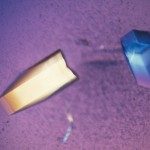Link to Pubmed [PMID] – 18487606
J. Biol. Chem. 2008 Jul;283(29):20053-9
Nucleoside 2′-deoxyribosyltransferases catalyze the transfer of 2-deoxyribose between bases and have been widely used as biocatalysts to synthesize a variety of nucleoside analogs. The genes encoding nucleoside 2′-deoxyribosyltransferase (ndt) from Lactobacillus leichmannii and Lactobacillus fermentum underwent random mutagenesis to select variants specialized for the synthesis of 2′,3′-dideoxynucleosides. An Escherichia coli strain, auxotrophic for uracil and unable to use 2′,3′-dideoxyuridine, cytosine, and 2′,3′-dideoxycytidine as a source of uracil was constructed. Randomly mutated lactobacilli ndt libraries from two species, L. leichmannii and L. fermentum, were screened for the production of uracil with 2′,3′-dideoxyuridine as a source of uracil. Several mutants suitable for the synthesis of 2′,3′-dideoxynucleosides were isolated. The nucleotide sequence of the corresponding genes revealed a single mutation (G –> A transition) leading to the substitution of a small aliphatic amino acid by a nucleophilic one, A15T (L. fermentum) or G9S (L. leichmannii), respectively. We concluded that the “adaptation” of the nucleoside 2′-deoxyribosyltransferase activity to 2,3-dideoxyribosyl transfer requires an additional hydroxyl group on a key amino acid side chain of the protein to overcome the absence of such a group in the corresponding substrate. The evolved proteins also display significantly improved nucleoside 2′,3′-didehydro-2′,3′-dideoxyribosyltransferase activity.

